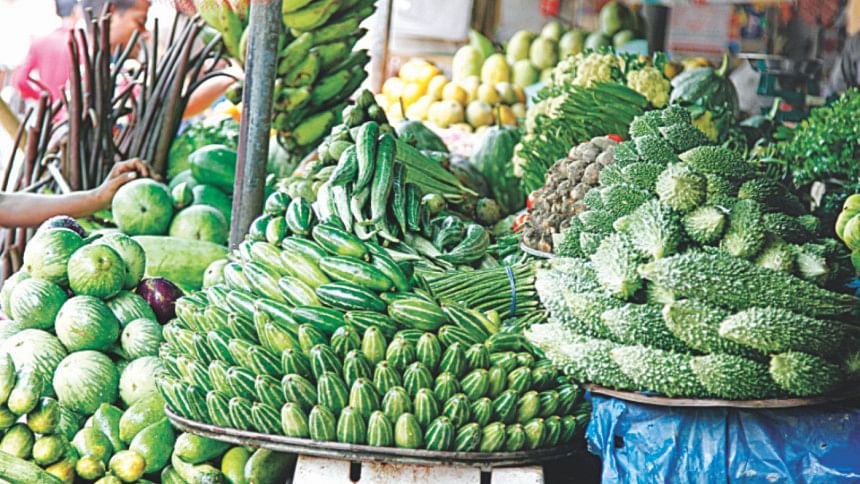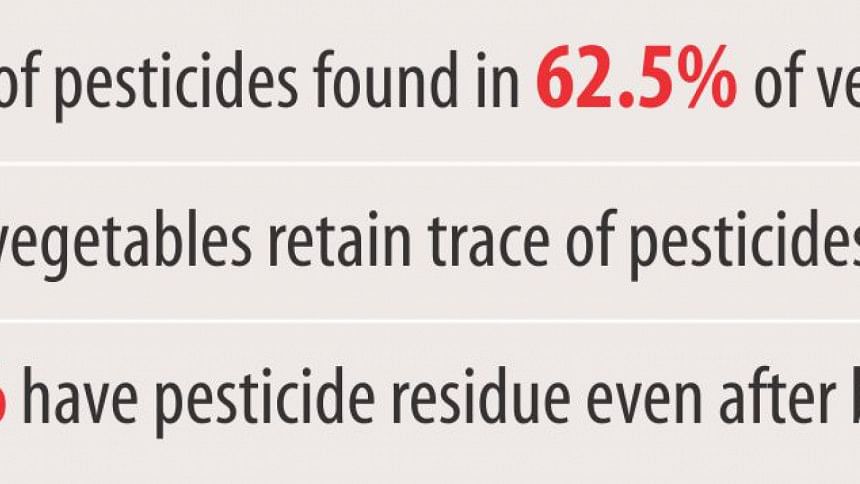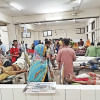Vegetables 'safe'

Increased awareness and government initiatives, such as the formulation of Food Safety Act 2013, have helped reduce the use of pesticide on vegetables grown across the country in the last few years.
Though pesticide is still applied on vegetables at various levels, the amount of the chemical substance you still consume largely depends on what you eat and how you eat it.
A recent government-sponsored research says 60 percent of the vegetables in the markets are tainted with pesticides used in the fields during harvest. It adds that half of the harmful chemicals may be washed away if rinsed properly.
The study done by Bangladesh Agricultural Research Council (BARC), found that the level of pesticide residue that remains after washing is within the permissible limit.
The test was conducted at an internationally accredited lab in Chennai, India, to test the pesticide residue level of raw, washed and cooked vegetables.
Ninety samples of 10 types of vegetables -- cauliflower, cabbage, country bean, ladies finger, long yard bean, eggplants, teasle gourd, bitter ground, red amaranth and green chillies -- from 10 kitchen markets in the capital and the seven other divisional headquarters were used for test.
Data shows pesticides were found in 62.5 percent of the vegetables collected directly from farms. Even after a rinse, 37.5 percent of the samples still contained pesticide residue. After cooking, 81.25 percent of the samples were safe for human consumption though they still contained some level of the contaminants.
“The presence of pesticide is found at dangerous levels when vegetables are collected from the fields. But it decreases when they are washed. Good news is that after cooking, it is safe for human consumption,” said BARC Director (nutrition) Md Monirul Islam, also the lead researcher of the study.
According to Codex, Food Safety and Standards Authority of India and European Union recommendations, a person can intake 0.002-0.05 milligram pesticides every day, adjusted to their body weight. After cooking, the pesticide amount falls below the limit.
In the examined vegetables, 30 pesticides were found, including chlorpyrifos, fenvelerate, dimethoate, spinosad, thiamethoxam and dithiocarbomates.
Chloropyrifos and Dimethoate are used for killing insects and worms.
Introduced after the 1950s by two American companies, they attack the nervous system of pests and are rated highly toxic and hazardous.
Dithiocarbomate, a fungicide, was found in cauliflower even after it was washed but not after cooking.

However, in country beans, pesticides were found even after cooking although the level was below the permissible limit.
In the case of long yard bean, washing made no difference in chlorpyrifos' presence but cooking helped eliminate the contaminant.
The presence of chlorpyrifos and cypermethrin was found in cabbage at all stages -- from collection, washing and even after cooking.
No pesticide was found in the case of ladies finger and eggplants.
Wais Kabir, former executive chairman of BARC, said increased awareness among consumers and growers and restriction on harvesting vegetables 72 hours after pesticide use have contributed to limiting the amount of pesticides found.
He also said the Department of Agricultural Extension has intensified monitoring of pesticide use.
Kabir added that a new generation of pesticides with no long term effect like dichloro diphenyl trichloroethane (DDT), a pesticide banned worldwide due its harmful effects, is being used in Bangladesh.
Kaoser Alam, a physician at Bangabandhu Sheikh Mujib Medical University said pesticide has long term implications on a person's health. “If one instantly consumes too much pesticide there's vomiting, drowsiness and a drop in blood pressure. But prolonged consumption may result in blood, esophagus or stomach cancer.”
According to the World Health Organisation estimates, there were three million global cases of acute and severe pesticide poisoning with some 220,000 deaths every year, the majority of them in developing countries.
In his recommendations after the study, Monirul Islam suggested all the stakeholders need to be more active in ensuring food safety from farm-to-fork.
He also said the vegetables should be collected from field 72 hours after spray of pesticide.
He stressed the need for creating more awareness among farmers about judicious and proper application of pesticides.

 For all latest news, follow The Daily Star's Google News channel.
For all latest news, follow The Daily Star's Google News channel. 








Comments